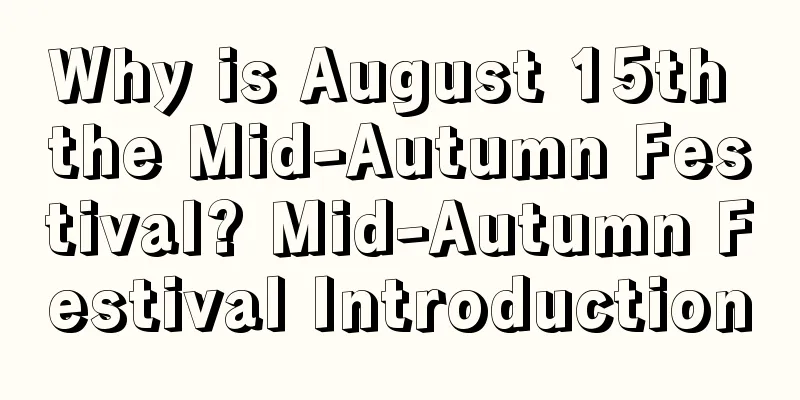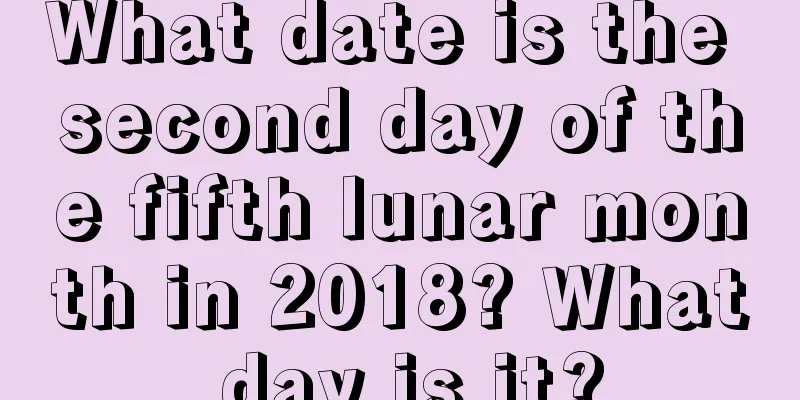Why is August 15th the Mid-Autumn Festival? Mid-Autumn Festival Introduction

We all know that August 15th of each year is the Mid-Autumn Festival, the second largest traditional festival in my country, but do you know why August 15th is the Mid-Autumn Festival? Let’s take a look at the introduction to the Mid-Autumn Festival. In the eighth month of the lunar calendar, the sky is high and the clouds are light, and the moon is clear in the cold pond; in the eighth month of the lunar calendar, the wind is clear and the air is refreshing, and the osmanthus fragrance is in the air; in the eighth month of the lunar calendar, the world is colorful and the harvest is abundant. Come to Shuimoxiansheng.com to learn more about the eighth month of the lunar calendar in 2019.Why is August 15th the Mid-Autumn Festival? Mid-Autumn Festival IntroductionAccording to the Chinese calendar, the seventh, eighth and ninth months of the lunar calendar are autumn. August is the middle month of autumn, and August 15th is the middle day of August, so this festival is called "Mid-Autumn Festival". "Dreams of the Southern Song Dynasty" by Wu Zimu of the Southern Song Dynasty records: "The 15th day of the eighth month is the Mid-Autumn Festival. This day is exactly the middle of the three autumns, so it is called Mid-Autumn Festival." The eighth month of the lunar calendar is the second month of autumn, called Mid-Autumn, and the 15th day of the eighth month is in the middle of Mid-Autumn, so it is called Mid-Autumn Festival. This is one of the reasons for the origin of the Mid-Autumn Festival.The origin of the Mid-Autumn Festival originated from the moon worship in ancient my country. Mid-Autumn Festival is a festival of the moon. On the night of Mid-Autumn Festival, the moon is the brightest and roundest, and the moonlight is the most beautiful, gentle, round, and tranquil, giving people a sense of mystery, which leads to people worshipping the moon more than worshipping the sun. Because ancient people attached great importance to the moon, many customs were related to the moon. There is a custom of offering sacrifices to and worshipping the moon in ancient my country. Because the moon is the roundest on August 15th and is suitable for worshiping, the Mid-Autumn Festival was born. Worshiping the moon is a custom passed down by emperors of all dynasties. The Moon Altar outside Fuchengmen in Beijing today was built during the Jiajing period of the Ming Dynasty to worship the moon. Mid-Autumn Festival customs:Moon Festival:"Autumn evening moon" was recorded in "Book of Rites" as early as now, which means worshiping the moon god. At this time, people would welcome the cold and worship the moon, and set up incense tables. In the Zhou Dynasty, the Mid-Autumn Festival was celebrated every year with the welcoming of the cold and the worship of the moon. A large incense table is set up, and offerings such as moon cakes, watermelons, apples, red dates, plums, grapes, etc. are placed on it. Moon cakes and watermelons are absolutely indispensable, and the watermelon must be cut into a lotus shape. Under the moon, the statue of the moon god is placed in the direction of the moon, red candles are lit, and the whole family worships the moon in turn. Then the reunion moon cakes are cut by the housewife. The person who cuts the cake should calculate in advance the total number of people in the family, including those at home and those away. The cake should not be cut too much or too little, and all should be of the same size. The custom of worshiping the moon is also popular among ethnic minorities. Moon worship: According to legend, Wuyan, an ugly girl in ancient Qi State, worshipped the moon devoutly when she was young. When she grew up, she entered the palace with her outstanding character, but was not favored. On the fifteenth day of the eighth month of a certain year, the emperor saw her under the moonlight and thought she was exceptionally beautiful. He later made her queen, and thus the Mid-Autumn Festival moon worship originated. Chang'e in the moon is famous for her beauty, so young girls worship the moon, wishing to "look like Chang'e and have a face as bright as the moon." The Dai people in Yunnan also have the custom of "moon worship" on Mid-Autumn Night. Moon Appreciation: The custom of appreciating the moon on Mid-Autumn Festival was very popular in the Tang Dynasty, and many famous poems by poets contain verses about the moon. By the Song Dynasty, the custom of appreciating the moon during the Mid-Autumn Festival became more popular. During the Ming and Qing dynasties, moon-worship and moon-appreciation activities among the court and the public were even more large-scale, and many ancient monuments such as "Moon-Worship Altars", "Moon-Worship Pavilions" and "Moon-Viewing Towers" still remain throughout China. The literati and scholars had a special fondness for moon-appreciating. They would either climb up towers to admire the moon or go boating to admire the moon, drink wine and compose poems, leaving behind many popular masterpieces that will last forever. To this day, sitting together as a family and appreciating the beauty of the bright moon in the sky is still one of the essential activities during the Mid-Autumn Festival. Tide Watching: In ancient times, in addition to moon-watching during the Mid-Autumn Festival, watching the tide was another major Mid-Autumn Festival event in Zhejiang. The custom of watching the tide during the Mid-Autumn Festival has a long history. As early as the Han Dynasty, there was a very detailed description of it in Mei Cheng's "Seven Hairs". After the Han Dynasty, the custom of watching the tide during the Mid-Autumn Festival became more popular. There are also records of watching the tide in Zhu Tinghuan's "Supplement to Wulin Old Stories" in the Ming Dynasty and Wu Zimu's "Dreams of the Southern Song Dynasty" in the Song Dynasty. Guess the riddle: On the full moon night of the Mid-Autumn Festival, many lanterns are hung in public places, and people gather together to guess the riddles written on the lanterns. As this is a favorite activity for most young men and women, and love stories are also told during these activities, guessing lantern riddles has also evolved into a form of love between men and women. Eating mooncakes: Moon-watching and moon-eating are essential customs for the Mid-Autumn Festival in various parts of China. As the saying goes, "The moon is full on the 15th day of the eighth month, and the Mid-Autumn mooncakes are fragrant and sweet." With the development of the times, people gradually combine moon-watching with mooncakes, which symbolizes family reunion and expressing longing. At the same time, mooncakes are also an important gift for friends to keep in touch during the Mid-Autumn Festival. Destiny is not one thing, but is divided into fate and luck. Fate is innate, while luck changes in different stages of life. The luck at different times is different. Do you want to know when your good luck will come? Take a look at the [ Excellent Calculation ] below, and may you have peace and happiness in your life! |
Recommend
When will the baby be born if you are pregnant on Mother's Day in 2020?
Every day, a lot of people get pregnant, and natur...
What solar term is Jingzhe? Is it possible to move house during the Jingzhe solar term in the Gengzi year of 2020?
What solar term is Jingzhe? Is it possible to move...
Is February 24th of the lunar calendar in 2018 not suitable for signing contracts?
Introduction: People like to choose whether to do ...
Is the sixth day of the sixth lunar month in 2021 a good day? Is it suitable for opening a business?
The sixth month of the lunar calendar, which is be...
Is it good to have a baby at a young age? Are babies born in the Little New Year of 2019 lucky?
The 23rd and 24th of the twelfth lunar month are t...
Is the child born on the first day of the seventh lunar month in 2022 a Leo?
Children born at different times have different zo...
What can we do for Christmas 2021? What are the customs and traditions of Christmas?
As December 2021 comes to an end, Christmas arrive...
When is the Lantern Festival on the 15th day of the first lunar month in 2018? How many days until the Lantern Festival?
Introduction: The Lantern Festival is an important...
Is it good to have a girl born on the third day of the sixth lunar month in 2021? Will you become rich and powerful?
Whether a child will be rich and powerful is relat...
What are the customs of Mid-Autumn Festival? Which solar term does the Mid-Autumn Festival fall on?
What are the customs of Mid-Autumn Festival? Which...
Is December 22nd of the twelfth lunar month in 2018 a suitable date to have a girl? What are the auspicious and inauspicious aspects of the lunar calendar?
China is a traditional country that is particular ...
Is April 19th of the lunar calendar 2021 a good day? How about same-day moving?
A lot of people move every day, but not every day ...
Can a funeral be held on the 24th day of the sixth lunar month in 2018? What does the hexagram show on that day?
Let’s see whether it is suitable to hold a funeral...
What season is Bailu in 2021? What to eat during Bailu?
The White Dew is approaching and birds are migrati...
Is it good for a boy to be born on January 26th of the lunar calendar in 2021? Boy's fate analysis
There are a lot of people born every day, but diff...









